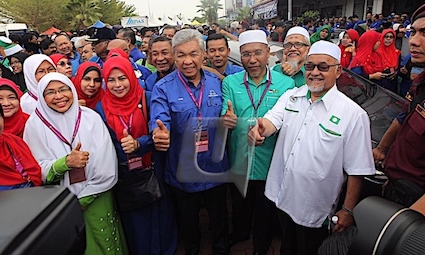PETALING JAYA: Any move by the Pakatan Harapan government to reinstate the 30% bumiputra shareholding quota in listed companies will cause further drops in the local share market, says Datuk Seri Dr Wee Ka Siong.
The MCA president said that such policies, if introduced, could accelerate outflows from foreign investors because new stock market listings in the country are at an all time low.
“Our stock market fell badly last year and is the sole loser in Asia this year,” Dr Wee said in a Facebook post on Sunday (March 31).
He was responding to Prime Minister Tun Dr Mahathir Mohamad, who said that the 30% bumiputra shareholding quota in listed companies is necessary because bumiputras are not prudent in managing finances and tend to spend on unnecessary things.
According to Dr Wee, the issue of uneven distribution of wealth and income is not between different races, but within each racial group.
He said that by reinstituting the 30% quota system in public listed companies, it will encourage the wealthy with political and economic means to continue accumulating wealth and equity.
“Such a requirement will deter foreign direct investment flows, disincentivise business investment, and promote unproductive rent-seeking activities via ‘Alibaba collaboration’.
“It couldn’t work when we were not yet deeply integrated into the world economy when it was implemented 40 years ago, how it is going to work when our economy is already so deeply open and linked to the world now?” he questioned.
In 2009, during the former Barisan Nasional administration under former premier Datuk Seri Najib Razak, the government had removed the 30% bumiputra requirement for companies seeking to be public listed.
If Dr Mahathir really intends to improve the habits of investment and savings among the Malays, then the government should start providing them with the incentives to do so, said Dr Wee, adding that effective economic policies have always been incentive-oriented.
“Malays are not used to accumulating shares? Then give tax incentives for savings and shareholdings, and educate students on investment and shares through school syllabus/extracurricular activities,” he said.
“Give tax preferences on small investors so that they become more likely to own shares,” he added.
An affirmative action policy like the 30% bumiputra shareholding quota in listed companies, Dr Wee said, is outdated, short-sighted, and doomed to fail.
“Otherwise, why is it still not showing any results despite being practised for more than 20 years?” he questioned.
Dr Wee pointed out that plans to bring back the 30% bumiputra shareholding quota in listed companies would not facilitate the bumiputra communities to directly hold shares if they still do not have access to resources and funding channels.
“In fact, the uneven distribution of wealth in the Malay community will only get worse.
“If the government believes that equity is too concentrated, and hence needs to be de-concentrated, then policies should be incentive-based and focused on the equity-less majority, not the equity-rich elite,” he added.- Star










